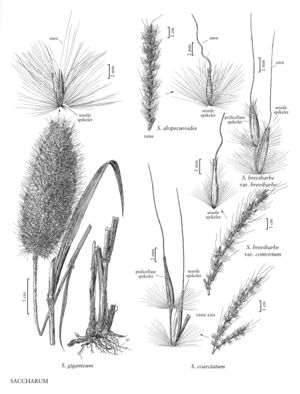Difference between revisions of "Saccharum brevibarbe var. contortum"
Synonyms: Saccharum contortum Erianthus contortus
Treatment appears in FNA Volume 25. Treatment on page 612.
imported>Volume Importer |
imported>Volume Importer |
||
| Line 46: | Line 46: | ||
|publication year= | |publication year= | ||
|special status= | |special status= | ||
| − | |source xml=https://bitbucket.org/aafc-mbb/fna-data-curation/src/ | + | |source xml=https://bitbucket.org/aafc-mbb/fna-data-curation/src/200273ad09963decb8fc72550212de541d86569d/coarse_grained_fna_xml/V25/V25_1505.xml |
|subfamily=Poaceae subfam. Panicoideae | |subfamily=Poaceae subfam. Panicoideae | ||
|tribe=Poaceae tribe Andropogoneae | |tribe=Poaceae tribe Andropogoneae | ||
Latest revision as of 17:57, 11 May 2021
Upper lemmas of sessile spikelets initially entire, becoming bifid at maturity, teeth about 2 mm; awns 10-18 mm, spirally coiled basally.
Distribution
Md., Okla., Miss., Tex., La., Del., Ala., Tenn., N.C., S.C., Va., Ark., Ga., Ky., Fla.
Discussion
Saccharum brevibarbe var. contortum grows in moist, sandy pinelands and open ground of the coastal plain, from Maryland to Florida and inland to Tennessee and Oklahoma. Initially, the awns in var. contortum are not coiled and the lemmas are entire but, as the spirals develop, they tear the lemmas, creating the bifid apices.
Selected References
None.
Lower Taxa
None.
